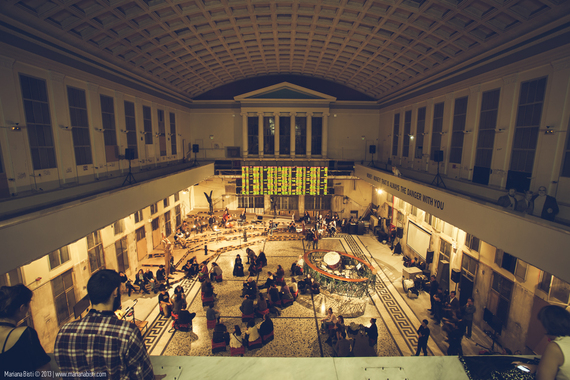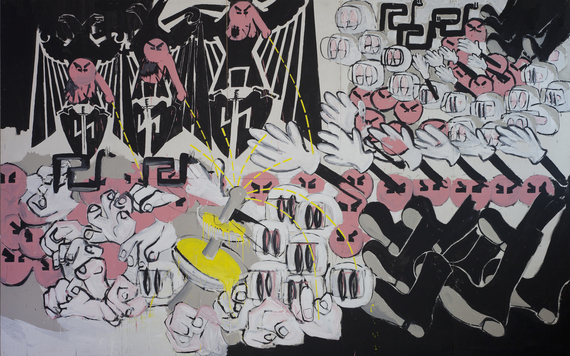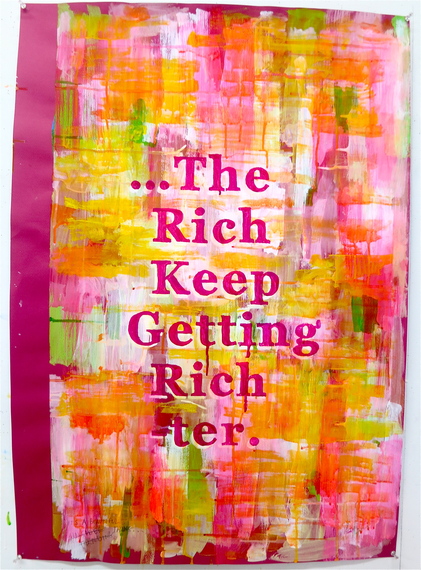The Greek economic crisis, is, among other things, a crisis of confidence. Investors, worried about the country's finances, pulled out their capital, and in doing so drove up interest rates and drove down the Greek economy to a near depression, provoking the default they so feared. Economists call this reversal of capital flows "a sudden stop." It is a vulnerability shared by all countries that have to borrow in a foreign currency, which effectively describes the Euro from Greece's perspective. Such economies are classified as financially "fragile."
These surprisingly emotional terms from economics -- "crisis of confidence", "fragile" -- describe Greek society today. This sudden stop is the reality Greek artists must work under. And this year's Athens Biennale, titled AGORA, has responded to this bleak situation by taking as its theme the question: "Now What?"
The abandoned Athens Stock Exchange, site of the Biennale
(Kyklos Ensemble photo by Mariana Bisti)
The Biennale, fittingly, is housed in the abandoned Athens stock exchange, a heavily scarred yet still elegant building. I spent a week there in October where I witnessed artists attacking the "Now What?" question through many methods: performance, workshops, and lectures, with audience participation always a key element. Fixed works on display were notable for their ability to fuse the activism felt by many artists with formal, visual solutions. This is exceptionally hard to do because even if the damage done by the crisis is apparent, the economic mechanisms underlying it often involve what economists call "invisible exports" (a type of financial flow) which by definition are hard to represent.
Not all the work being produced in Athens is centered on economics, more is focused on the political and social aftershocks. For instance the painting "Smelly," by Biennale co-director Poka-Yio (not at Agora), of "cartoon-like neo-Nazis parading in Athens," captures but also somehow radiates out the Weimar like political violence and fear now in Greece.
Poka-Yio, Smelly, 2013 (Athens, Greece)
Artists in the two art world capitals, New York and London, are operating in a very different economic reality from this charged atmosphere of Athens. Here the art market bubble is in place. The bubble has had distorting effects, on artistic production, on critical focus, even on conversation: the economics of the bubble are so remote from and unmoved by most artists' practices that the constant talk about it reminds me of a dog howling at the moon.
Very few artists or galleries can successfully navigate the bubble. Despite all the money flowing into the art market there is the worry that the time of greatest creative outbursts in these cities lies not in the present but the past.
Athens represents an alternative to this middle-aged predicament. But visiting Athens, even if cheap, can be emotionally costly. Visitors are vulnerable to the legitimate criticism they are voyeuristically indulging in economic disaster porn. (This isn't the whole story: Greece remains an advanced Western country, just one caught in a credit crunch. The hotel and restaurant industries are a generation ahead of America's. And though I expected to find protests everywhere, during my time in Athens I only saw one restless crowd -- it turned out to be people impatient to get into a showing of Frances Ha, the indie film by mumble-core star Greta Gerwig and Noah Baumbach).
The peripheral European countries, including Greece, are not recovering economically. Current fixes are half-baked, politically unfeasible, or actively destructive such as austerity.
The Belgian economist Paul De Grauwe has written of the Eurozone, "a monetary union can only function if there is a collective mechanism of mutual support." This is lacking in the EU. As a result, according to De Grauwe, there is little to "soften the pain for many people created by the booms and busts in capitalist societies."
This creates a heavy burden on art, to fill this gap. But much of the art I saw in Athens not only provided solace, it actually generated the confidence needed in Greece today. And if European economic and political institutions are failing, at the very least there are still functioning art institutions like the Athens Biennale, which alone seem able to provide the "collective mechanisms of mutual support" required in Europe right now.
To watch a video of the Athens Biennale, This is AGORA click here


